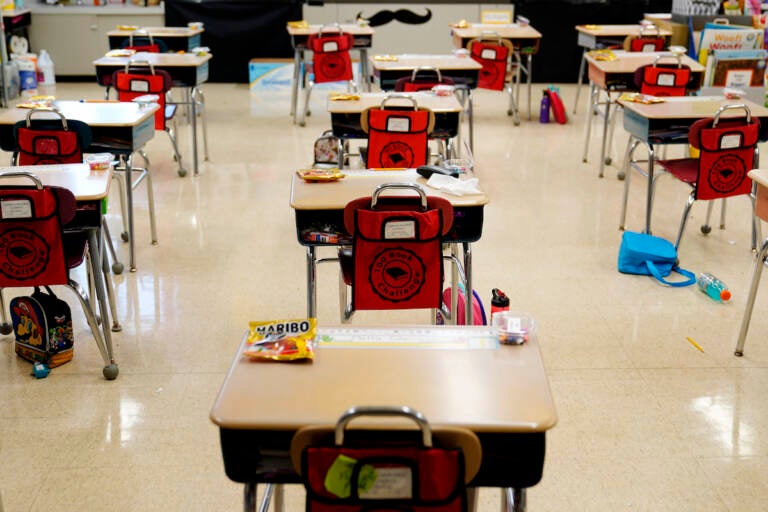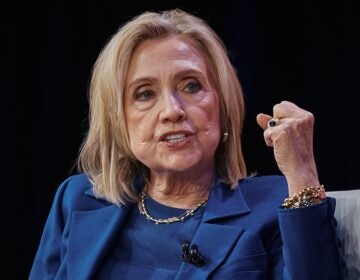Pa.’s ChildLine Registry does more harm than good for children of color
Attorney Jamie Gullen, who has spent a decade representing youth at Community Legal Services, takes aim at the state’s ChildLine Registry for violating due process rights.

File photo: In this Thursday, March 11, 2021 file photo, desks are arranged in a classroom at an elementary school in Pa. (AP Photo/Matt Slocum, File)
As a former elementary school teacher, co-founder of the Youth Justice Project at Community Legal Services (CLS), and parent of two small children, I care deeply about the well-being of children, youth, and families.
During my 10 years representing youth as an attorney at CLS, I have become convinced that Pennsylvania’s ChildLine Registry — purportedly created to help children and youth — is far more likely to cause them harm, especially if they are Black, brown, and poor.
Parents, caregivers, and even children as young as 14 can be placed on the registry based on abuse or neglect allegations made by an investigating caseworker, without an opportunity to have a hearing first. People are often placed on the registry based on accidental injuries or neglect allegations that stem from conditions of poverty.
Once placed on the registry, they are unable to work in a wide range of fields, including all childcare and many health care jobs. Parents, caregivers, and youth placed on the registry are also unable to volunteer for school or extracurricular activities.
In our experience at CLS, the vast majority of parents, caregivers, and youth harmed by this system — over 90% of our clients — are Black and brown.
La Liga del Barrio, a volunteer-run youth basketball league in North Philadelphia, has served upwards of 15,000 children and youth in the past 22 years. It has had to turn away dozens of caring parents who wanted to volunteer with the league but couldn’t because they were listed on the registry.
For example, a team from La Liga was invited to attend a tournament in Indianapolis, and all children needed an adult chaperone to accompany them. But several kids weren’t able to go because their parents could not provide the required ChildLine clearances. Those kids had to miss the tournament.
When parents and caregivers are unable to work or advance their careers because they have been listed on the registry, their children are harmed.
A CLS client I’ll call M.A. had to drop out of nursing school because she was placed on the registry without a hearing first.
While navigating a lengthy and complex process to clear her name, she remains on the registry and is now permanently unable to rejoin her nursing program. She has several children to support and has lost a vital opportunity to advance her career and earnings due to this broken system.
La Liga del Barrio, M.A., and a group of other parents, caregivers, and nonprofit organizations have recently filed suit in Commonwealth Court in the case of A.W. v. Commonwealth, alleging that the registry’s operation is unconstitutional.
The suit — filed by CLS, Peter (Tad) LeVan of LeVan Stapleton Segal and Cochran LLC, and Seth Kreimer — contends that the registry system violates due process rights because accused individuals are not provided with a meaningful opportunity to be heard by a neutral party before being listed. Instead, people are given a short deadline of 90 days to appeal a ChildLine registry listing. If they miss it, they remain on the registry for life.
Many people never receive their appeal notice, don’t understand the notices they do receive, or cannot afford an attorney to navigate the confusing process.
La Liga has found many parents are unaware of their registry status until requesting clearance to volunteer. Many parents are Spanish-speaking and the notices, if they ever arrive, are in English. Of those able to get to a hearing, more than 90% are removed from the registry.
Fortunately, our courts and our legislature have an opportunity to act in the best interests of children and families by requiring a hearing before someone is placed on the registry. The legislature can also replicate what many other states do and create a tiered registry so that a parent accused of missing a child’s doctor appointments and a person accused of sexually abusing a child are not treated the exact same way and placed on the registry for life.
Caregiving professions are in desperate need of qualified workers, and our children need the full engagement of their families. Children and youth will be safer and better off under a system that does not unnecessarily box them or their parents out of earning a decent income. Pennsylvania must stop the practice of condemning youth, parents, and caregivers as “child abusers,” especially when they have not had a meaningful opportunity to defend themselves.
Jamie Gullen is the managing attorney of the Employment Unit and Youth Justice Project at Community Legal Services. She graduated from the University of Pennsylvania Carey Law School in 2012 and has spent the past decade representing young people, parents, and workers who face barriers to employment. Prior to law school, she taught elementary school in the Bronx.
WHYY is your source for fact-based, in-depth journalism and information. As a nonprofit organization, we rely on financial support from readers like you. Please give today.





